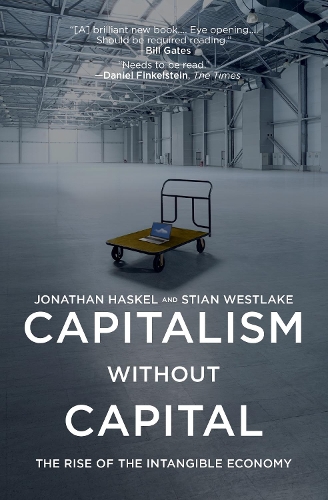
Capitalism without Capital: The Rise of the Intangible Economy
(Paperback)
Available Formats
Publishing Details
Capitalism without Capital: The Rise of the Intangible Economy
By (Author) Jonathan Haskel
By (author) Stian Westlake
Princeton University Press
Princeton University Press
2nd January 2019
United States
Classifications
Tertiary Education
Non Fiction
Organizational theory and behaviour
Research and development management
Economic history
330.91722083
Physical Properties
Paperback
296
Width 133mm, Height 203mm
Description
Selected for Askblog's Books of the year 2017, chosen by Arnold Kling
One of Financial Times (FT.com) Best Books of 2017: Economics
One of the Economist.com "Wise Words 2017 Books of the Year" in Economics and Business
One of Blackwell's Best of Non-Fiction 2017
Early in the twenty-first century, a quiet revolution occurred. For the first time, the major developed economies began to invest more in intangible assets, like design, branding, and software, than in tangible assets, like machinery, buildings, and computers. For all sorts of businesses, the ability to deploy assets that one can neither see nor touch is increasingly the main source of long-term success. But this is not just a familiar story of the so-called new economy. Capitalism without Capital shows that the growing importance of intangible assets has also played a role in some of the larger economic changes of the past decade, including the growth in economic inequality and the stagnation of productivity. Jonathan Haskel and Stian Westlake explore the unusual economic characteristics of intangible investment and discuss how an economy rich in intangibles is fundamentally different from one based on tangibles. Capitalism without Capital concludes by outlining how managers, investors, and policymakers can exploit the characteristics of an intangible age to grow their businesses, portfolios, and economies.
'CompellingHaskel and Westlake have mapped the economics of a challenging new economy.' Martin Wolf,Financial Times
'One of this year's most important and stimulating economic reads.Read this book.' Tyler Cowen,Marginal Revolution
'For an introductionit would be hard to do better thanCapitalism without Capital, which is clear and lively and raises without having all the answers the relevant questions.' Diane Coyle,Enlightened Economist
'The book makes its case in a lighthearted, conversational way that will appeal to economists and non-economists alike.' The Economist
'One of the year's most talked-about books.' John Harris,The Guardian
Reviews
"One of the Economist.com Wise Words 2017 Books of the Year in Economics and Business"
"One of Blackwells Best of Non-Fiction 2017"
"One of Financial Times (FT.com) Best Books of 2017: Economics"
"Selected for Askblogs Books of the year 2017, chosen by Arnold Kling"
Author Bio
Jonathan Haskel is professor of economics at Imperial College Business School. Stian Westlake is advisor to the UK Minister of Science and Innovation. Haskel and Westlake were cowinners of the 2017 Indigo Prize.
